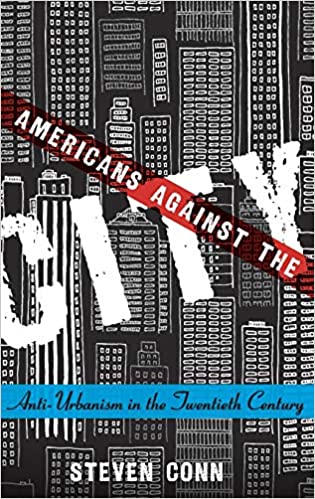Anti-Urbanism and the Pandemic

Americans as a society hate cities, even as most of them live in a city. From Thomas Jefferson to Frank Lloyd Wright and so many others, key thinkers about American life have fundamentally distrusted cities, density, and urban life as antithetical to American life. The entire rise of the suburbs is based on this fundamental idea, as opposed to France where the suburbs are places the undesirables live. The urban crisis of the 1960s-80s was created by a whole set of government policies to enforce this, from redlining to FHA home loans to the Interstate Highway Act. Steven Conn’s book, pictured above, is a great entryway into this history.
So once again, the pandemic led to beliefs that the cities were DOOMED, DOOMED I TELL YOU! So many stories last summer about people leaving the cities and moving to the burbs or their second home in the Hamptons or whatever. Not surprisingly, it was all bullshit. So the question is why does this narrative continue to exist.
What is so alluring about the perpetually imminent End of Cities?
Why won’t that idea itself die?
In America, it has been like a virus strain mutating to the moment: Surely disease will kill cities, or congestion will, or corruption, or suburbanization, or fiscal crises, or technology, or crime, or terrorism, or this pandemic (unlike all the pandemics that came before it).
Inevitably, the city survives. And yet so does the belief it will fall next time. The Upshot asked more than a dozen people who think a lot about cities — historians, economists, sociologists and urban policy experts — about the strange staying power of this narrative.
“Anti-urbanism is an American religion, practiced widely and frequently in ordinary times, and passionately when cities are actually in trouble,” wrote Eric Klinenberg, a sociologist at N.Y.U.
That ideological strand is particularly American and goes all the way back to Thomas Jefferson. Cities have been associated with corruption and inseparable from stereotypes about immigrants and African Americans. They’ve been viewed as unhealthy places to live, particularly for families, said Ingrid Gould Ellen, a professor of urban policy and planning, also at N.Y.U.
And the pandemic struck as ideological disdain for cities was again becoming a central theme of partisan politics in America, with President Trump and other conservative politicians and commentators seeming to delight in any sign of urban struggles.
“That people are attempting to process what was an insane year through anti-urbanism is extremely predictable,” said David Schleicher, a Yale Law School professor. “It would be weird in fact if people responded to this the same way that French people did. No one in France is running around going, ‘Paris is over!’”
American exceptionalism is almost always wrong. But in this case, is it right? Is there another nation that is so anti-urban despite being so urban? Asia and Europe sure aren’t this way. Australia? I don’t know. It’s weird.
